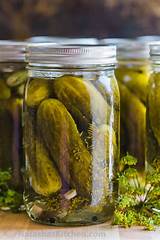The Ultimate Guide to Canning Dill Pickles: A Crisp, Tangy Delight
Are you ready to experience the unparalleled crunch and tang of homemade dill pickles? This comprehensive guide will walk you through the process of canning dill pickles, ensuring you achieve perfectly preserved jars of deliciousness that will last throughout the year. Whether you're a seasoned canner or a complete beginner, this recipe will empower you to create a batch of pickles that will impress even the most discerning palates.
Getting Started: Gathering Your Supplies
Before we dive into the canning process, let's ensure you have all the necessary ingredients and equipment. This preparation is key to a successful canning experience.
Essential Ingredients:
- Cucumbers: Choose firm, small to medium-sized cucumbers, ideally Kirby or pickling cucumbers. Avoid large or overly mature cucumbers, as they tend to be less crisp.
- Dill: Fresh dill is ideal, but dried dill can also be used. The fragrant dill is what gives dill pickles their signature flavor profile.
- Garlic: Adds a delightful pungent aroma and flavor.
- Pickling Salt: This is crucial! Do not substitute table salt. Pickling salt is non-iodized and dissolves easily, preventing cloudiness in your pickles.
- Vinegar: White distilled vinegar is preferred for its clean taste and lack of color.
- Water: Use filtered or spring water for the best results.
- Pickling Spices: A blend of spices like mustard seeds, coriander seeds, and black peppercorns add depth and complexity. (You can find pre-mixed pickling spice blends easily.)
Essential Equipment:
- Canning Jars: Use half-pint or pint-sized canning jars with lids and bands. Ensure your jars and lids are clean and free from chips.
- Canning Pot: A large stockpot or canner is necessary for processing the jars.
- Jar Lifter: This tool prevents burns when handling hot jars.
- Lid Lifter Magnet: Useful for easily retrieving lids from boiling water.
- Funnel: Makes filling jars easier and prevents spills.
- Bubble Remover: A tool or utensil to help remove air bubbles from jars.
The Dill Pickle Canning Process: A Step-by-Step Guide
This detailed guide will make the canning process clear and easy to follow.
Step 1: Preparing the Cucumbers and Jars
Wash the cucumbers thoroughly. Trim the ends and pack them tightly into sterilized jars, leaving about ½ inch headspace.
Step 2: Preparing the Brine
In a large saucepan, combine the vinegar, water, pickling salt, dill, garlic, and pickling spices. Bring the mixture to a rolling boil, stirring until the salt dissolves completely.
Step 3: Filling the Jars
Carefully pour the boiling brine over the cucumbers, leaving that crucial ½-inch headspace. Use a bubble remover to release any trapped air bubbles.
Step 4: Processing the Jars
Wipe the jar rims clean, apply lids and bands, and tighten fingertip-tight. Carefully lower the jars into the canning pot, ensuring they are completely submerged in boiling water. Process the jars according to the recommended time for your altitude (refer to a reliable canning guide for specific processing times).
Step 5: Cooling and Checking for Seals
Remove the jars from the canner using a jar lifter and let them cool completely. You should hear a "pop" sound as the jars seal. Check each jar to ensure a proper seal. Any jars that haven't sealed should be refrigerated and consumed within a week.
Tips for Extra Crispy Pickles
- Use pickling cucumbers: They are bred specifically for pickling and offer superior crispness.
- Add Calcium Chloride: A small amount of calcium chloride added to the brine helps maintain the cucumbers' firmness.
- Pre-chill your cucumbers: Chilling cucumbers before canning can help preserve crispness.
Storing Your Dill Pickles
Once completely cooled and sealed, your dill pickles can be stored in a cool, dark, and dry place for up to a year. Enjoy the fruits (or should we say, vegetables) of your labor!
Remember, always refer to a reputable canning guide for specific processing times and safety information based on your altitude. Safe canning practices are essential to prevent foodborne illnesses. Happy pickling!
